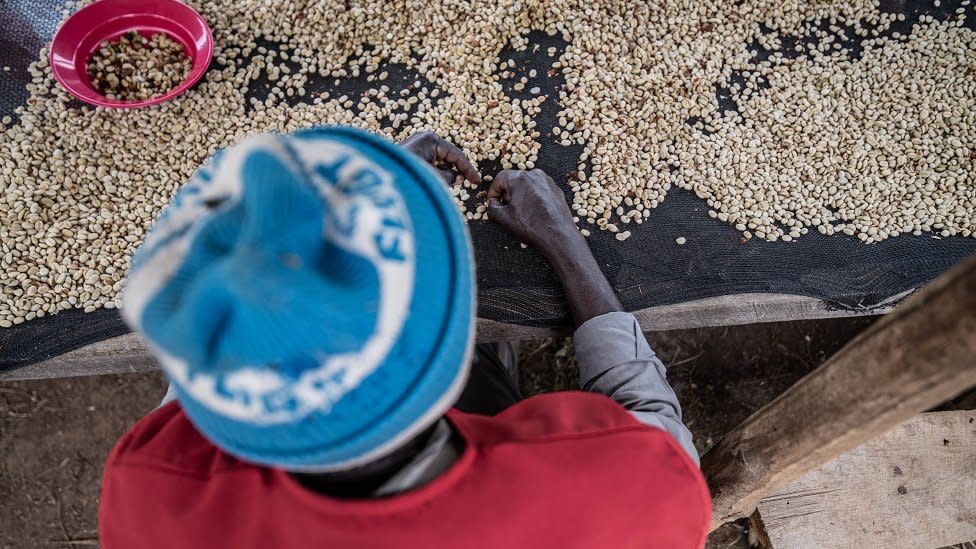
The Democratic Republic of Congo is better known for the brutality of its many rebel groups than the quality of its coffee, but one project is trying to change that, writes Moses Sawasawa.
An ideal climate and hilly terrain has seen generations of farmers grow Arabica coffee on Idjwi island in Lake Kivu, located between the Democratic Republic of Congo and Rwanda.
More recently, thousands of ex-combatants, including Koko Bikuba, say working here has changed their lives.
“When we arrived in this place, people were afraid of us,” the 37-year-old says. “My life has changed thanks to this work. I take care of six children who are studying.”
Though Mr Bikuba is reluctant to open up about his past, he says he “very much regrets having done so much harm to my country and especially to my community”.
Most of the former combatants here came from Masisi in DR Congo’s North Kivu province, which has seen decades of fighting.
The UN estimates that more than 120 militias operate across eastern DR Congo, which is rich in minerals often exploited by the armed groups.
It clearly heartens Mr Bikuba that some people on Idjwi who initially wrote him and his colleagues off as “thieves and killers” have since warmed to them.
“The turmoil of the forest is far from me now and I’m financially stable,” he adds, thanks to his job in logistics on the plantation.
Almost 2,400 former fighters are employed as farmers on Idjwi by the Co-operative Company of Innovative Coffee producers in Kivu (SCPNCK). They are mostly former militia fighters, although some, including Mr Bikuba, used to be soldiers, SCPNCK says.
The co-operative sells to countries around the world including the US, France and Belgium.
Owner Gilbert Makelele explains that the project began in 2012 as part of a peace initiative – but he also wanted to take on smugglers who, he says, took coffee from Idjwi island across the border into Rwanda from where they would sell it internationally at knockdown prices.
He is proud that SCPNCK “helps ex-combatants to make their own money and not from kidnapping or rape – everyone in the Congolese army is there because of unemployment”.
The coffee co-operative receives government funding and several ambassadors have visited to understand how it works, most recently the US ambassador to DR Congo, Mike Hammer.
Arabica coffee from this area is appreciated for its “full-bodied, fruity” character that develops a medium acidity, explains Belgium-based buyer Isabelle Prigo.
Coffee comes from coffea trees, which were first cultivated in Ethiopia thousands of years ago.
In modern-day cultivation, the seedlings are planted in soil bags, then take roughly five months to grow before they can be transplanted into the fields.
Slopes such as those on Idjwi are ideal because the terrain helps to stop soil erosion.
Visible in the middle of this shot are the rows of coffee dryers.
That is where the ripe, red coffee fruit – also known as cherries – are placed after being plucked by hand from the trees.
Twenty-nine-year-old former fighter Jacques sorts through the coffee dryer with colleagues.
This is another stage of quality control, where any under-ripe or spoiled cherries that found their way into the harvest are sifted out.
Across the industry, the more exacting this process is, the higher the taste scores awarded to coffee producers.
Later, the red outer layer of the coffee is sloughed off in a process calling milling.
Some producers use wet milling – also known as “washed coffee”, while others use dry milling – called “natural”.
SCPNCK follow the wet method, which shows off the bean’s distinctive origin and terroir by ridding it of parchment and mucilage, as well as the red pulp.
After washing, the coffee is dried.
Former soldier-turned-coffee taster Bisimwa Kabo, 27, is tasked with ensuring the product is of the highest standard.
Just one or two sour beans can impair the flavour of a whole batch.
The final step of the process sees the dried beans placed in sacks ready for delivery.
Roasting and grinding typically happens in the destination country, carried out by the distributor.
“In the 1980s, we used to export coffee to the US, Sudan and Ethiopia,” says Christine Mugoli of the National Office for Congolese Agricultural Products, adding that annual production back then stood at 500,000 tonnes compared with just 10,000 tonnes today.
Exports were handled by the government decades ago, but today are in the hands of co-operatives, she adds, although greater government investment is planned.
“It can be said that the government had abandoned coffee culture a little,” she says.
“We still want to fight to take back our place among the leading coffee-producing nation of Africa and the world.”
Koko Bikuba hopes that vision will see the success of Idjwi island replicated.
“I just ask the authorities to increase security in the east of the country, so other soldiers with similar wishes can seize this kind of opportunity.”
All photos subject to copyright.




